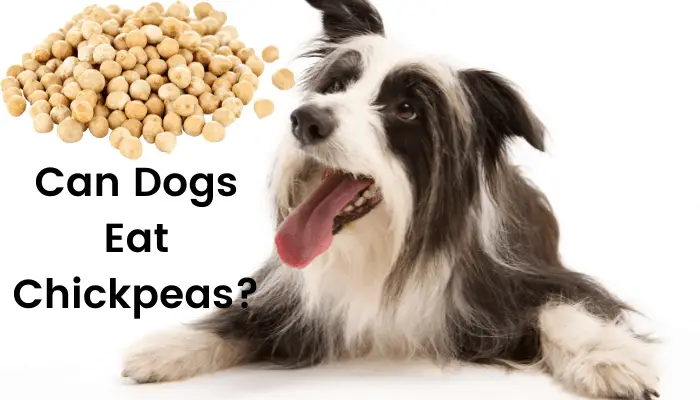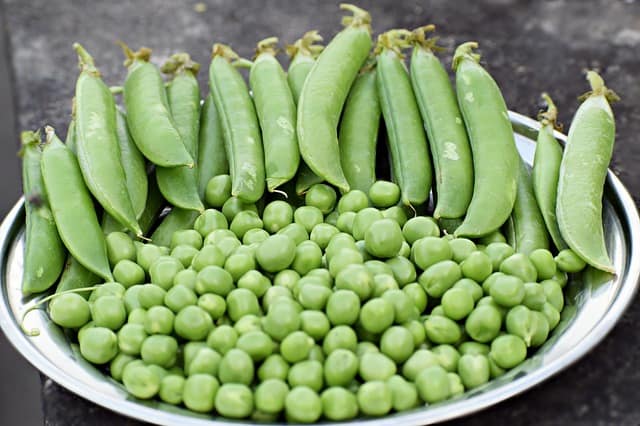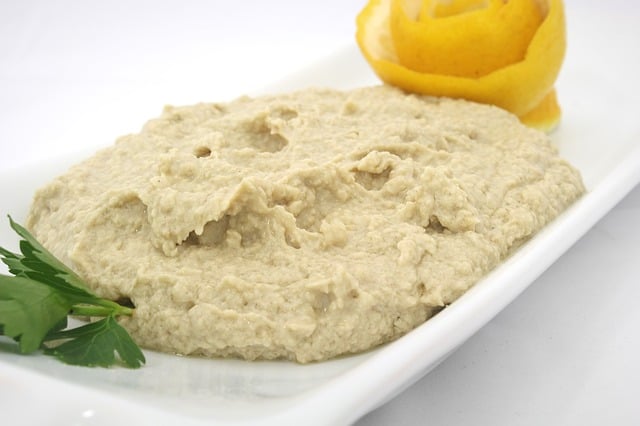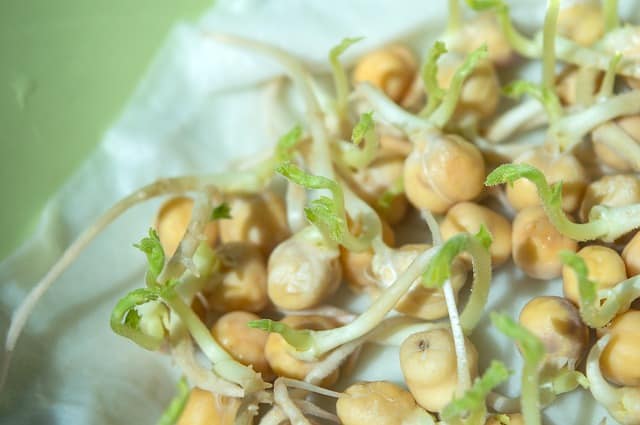
Chickpeas are an excellent source of protein and fiber, making them a great addition to your pup’s diet. They contain B-vitamins, iron, phosphorus, magnesium and zinc which can all help maintain good health for your four-legged friend. Additionally, chickpeas are high in dietary fiber which helps keep their digestive system healthy.
When it comes to feeding your pup chickpeas, the best way is to cook them first as they may be too hard in their raw form. Depending on the size of your dog you should adjust the serving size accordingly; small dogs should have about 1/4 cup cooked chickpeas while larger dogs can have up to one cup per day.
Make sure not to add any additional seasonings or oils as these could cause upset stomachs or other issues for some pups! Furthermore, make sure not to overfeed with chickpeas as this could pose potential risks such as flatulence and loose stools due to their high fiber content.
Can dogs eat chickpeas safely?
Yes, dogs can eat chickpeas or falafel, but plain without any additives and seasoning mixtures. You should watch out for the quantity and do not overdo it. You can add blended boiled chickpeas or sprouted blended chickpeas to your dog’s diet along with meat and eggs.
There are many beneficial properties in chickpeas, but it would be better if you introduced them slowly, in small quantities, to your dog’s meals. Always keep an eye on your little furry friend after eating the chickpeas, so you understand if something goes wrong or if its system doesn’t accept it.
Can Dogs Eat Canned Chickpeas?
Dogs can eat canned chickpeas, but it would be best if they were homemade, really low in sodium. Canned chickpeas have A LOT of salt, which you do not want to add to your dog’s daily nutrition plan. One way to make it better is to rinse them with cold water and then soak and let them for 12 hours inside water, so you take out most of the salt they have. So, a small portion of canned chickpeas will not cause any issues to your pup as long as they don’t contain other toxic seasonings, spices, and additives.
Fortunately, some companies that produce canned chickpeas have just chickpeas and water inside. They are safer to go with this kind of canned chickpeas for your dog; search for them in the stores. They should have low (if any) sodium, sugar, and additives. Before giving them to your pup, rinse them with cold water and soak for some hours, so if they contain anything, get it out of them as much as you can. Under these terms, they are pretty much a nice snack for your little (or big) friend.

Can Dogs Eat Raw Chickpeas?
Yes, dogs can eat raw chickpeas, as long as they are either fresh or sprouted.
In general, a raw diet is better for dogs as it provides more vitamins, minerals, and enzymes. You can add some fresh or sprouted chickpeas to your pup’s bowl, along with some raw ground meat and some healthy fatty acids.

Can Dogs Eat Hummus?
No, dogs should not have hummus if it is made with seasonings, garlic, onion, salt, and other stuff that may harm your dog’s health. On the other hand, yes, dogs can eat hummus if it is made from plain boiled or sprouted chickpeas with some good quality oils (olive oil, cod liver oil) for healthy EFA. (essential fatty acids)
Can Dogs Eat Falafel?
No, dogs cannot eat falafel. Even if it is made from plain boiled and after that fried chickpeas, without salt, garlic, or other harmful seasonings for dogs, it would be better if you completely avoid feeding your pup fried things. You could bake them and, instead of fried falafel, create some plant-based chickpea burgers. Well, that is something your dog would eat without any problem.
Can Dogs Eat Chickpea Flour?
Yes, dogs can eat chickpea flour but only when it is something else and not just flour. I mean, they are not going to eat just the flour alone, for sure! You could make some homemade dog biscuits with chickpea flour instead of using the common wheat flour. It is a gluten/grain free much healthier option.
Can Dogs Eat Dried / Dry Chickpeas?
No, dogs can’t eat dry chickpeas because they are dry for a reason. They are telling us not to eat them. All dry legumes have some anti enzymes, so they can be dry and sprout when the circumstances are good (usually when they are planted or just wet). So if you want to give chickpeas to your dog, please read the whole article. I explain the best ways dogs can eat chickpeas.
Can Dogs Eat Chickpeas And Lentils?
Yes, dogs can eat both of these legumes, but it would be better to feed them in separate meals. They will not have a problem eating them at the same meal, but they may become a little gassy. It’s your choice!
Can Dogs Eat Lentils?
Yes, dogs can eat moderate amounts of once-cooked lentils. They are a healthy source of plant-based protein as well as fiber that can help dogs with diabetes.
You may find lentils beneficial for your dogs. As lentils are not a complete diet for dogs, they must get enough vitamins, minerals, nutrients, and protein from other sources.
Make sure that they get enough of it. You should limit treats to 10% of your dog’s daily recommended food allowance if you give lentils as a treat.
It is important to introduce lentils slowly. A pet with a sensitive stomach may experience an upset stomach if they are suddenly introduced to lentils.
What Are The Chickpeas?
You have probably seen them in soups, salads, chickpea burgers, and falafel or hummus forms. You may know them as garbanzo beans too. Their origins come from the Mediterranean and the Middle East, and now they are everywhere. Despite their small roundly size, they contain a great nutritional profile.
Amount of Nutrients in 1 cup of chickpeas (164 g)
Energy (calories)267
Protein (g) 14.4
Fat (g) 4.2
Carbohydrates (g) 44.7, including 7.8 g of sugar
Fiber (g) 12.5
Calcium (mg) 80.4
Iron (mg) 4.7
Magnesium (mg) 78.7
Phosphorus (mg) 274
Potassium (mg) 474
Zinc (mg) 2.5 8–11
Copper (mcg) 0.6
Selenium (mcg) 6.1
Vitamin C (mg) 2.1
Folate (mcg) 280 400
Choline (mg) 69.7
Beta carotene (mcg) 26.2
Vitamin E (mg) 0.6
Vitamin K (mcg) 6.6
Are Chickpeas Good For Dogs?
As you can see, there is a lot of good stuff inside chickpeas, nutritionally speaking. Protein, fiber, many vitamins, and minerals can help to improve your dog’s health. Some popular health problems that chickpeas could help your dog with are:
Hypertension and Heart diseases – Chickpeas contain high amounts of potassium compared to their low sodium levels. Potassium can help widen the blood vessels. Low sodium and high potassium combined can help to lower hypertension and improve dogs’ health. Chickpeas which have a decent amount of fiber, help reduce the cholesterol level in the blood.
Help To Regulate Blood Sugar Levels – Diabetes – Chickpeas have a low glycemic index, releasing the energy slowly into the blood. No big spikes or dips like the foods with high glycemic index can lead to.
Cancer Aid – I won’t say that you can treat cancer on dogs with chickpeas, but the beneficial nutrients they provide can help with cancer avoidance. Selenium, for example, can help the liver to eliminate some substances that cause cancer; it also helps with the reduction of tumors.
Saponins and folate boost the prevention of cancer cell metastasis. Chickpeas also have adequate amounts of vitamin C, which boosts dogs’ immune systems and aids in the detoxification of the cells.
Reduce Inflammation – Arthritis – Chickpeas can help with chronic inflammation reduction because of the choline they contain. Choline will benefit old dogs which are racked with the pain of osteoarthritis.
It also can help with impulse transmission of the nerves, cellular membrane formation, and fat proper digestion and regulation from a dog’s system. All these will help canines with inflammation and arthritic problems.
Anal Gland Problems And General Constipation – The fiber that chickpeas contain will benefit your dogs if they have any problems with the expression of their anal gland. That’s because fiber helps with the proper stool formation so that dogs can eliminate it easily and without pain.
Proper stool formation that fiber also creates aids in the cure for constipation and gives your dog more “pleasurable” bowel movements. Dietary fiber also helps to maintain good bacteria in your dog’s bowels. You can read another article here about Sauerkraut how it can help with the good bacteria of a dog’s G.I. Tract.
Hunger – Obesity – Plant-based protein that chickpeas contain, along with dietary fiber, can successfully help the continuous hunger of dogs. If your furry friend must shed some weight, then you should consider adding some chickpeas to their diet. I recommend blended sprouted chickpeas with one raw egg yolk and fatless beef ground. This will keep them full for some hours and will help them with constipation too.
General Health – Calcium, potassium, and phosphorus
All electrolytes, including calcium, potassium, and magnesium, help maintain vital electrical impulses throughout your dog’s body. This allows their heartbeat to beat, their muscles to move, their nerves to transmit signals, and their brain to function normally. Magnesium is also important for the body to absorb these minerals. Calcium and phosphorus are essential for strong bones.
Iron is essential for keeping your dog’s blood cells healthy so that they can carry oxygen around the body. Zinc plays an important role in many metabolic functions. It is required for your dog to make hormones, DNA, grow hair, and keep its brain healthy.
Are Chickpeas Bad For Dogs?
Dogs who eat too many chickpeas may be affected. Chickpeas have high fiber content, so your dog might get a pup-set stomach. They may also experience loose stools and excess flatulence. A dog that eats a lot of legumes or becomes very gassy could be considered a medical emergency. Your vet should be notified immediately if your dog appears to be feeling bloated.
Chickpeas don’t have any inherent health issues and are not toxic. Your dog can enjoy chickpeas as long as they are cooked in plain form and given in moderation.
How To Feed Chickpeas To My Dog?
If you choose to cook chickpeas for your pup, make sure to rinse and drain the beans before cooking. Boil them in a pot of water until they are soft but not mushy. You can also add other ingredients such as vegetables or meat while boiling. Once cooked, mash the chickpeas with a fork or blend them into a puree if desired.
When serving cooked chickpeas as a snack, keep portions small and feed it to your pup no more than once per day. It is important to remember that chickpeas should only be served occasionally as part of an overall balanced diet that includes other proteins, carbohydrates and vegetables.
If you want to give your dog canned chickpeas, look for brands without added salt or sugar. Make sure to rinse the beans with cold water prior feeding so any excess salt or sugar can be removed before consumption by your pup

How Much Chickpeas Can Dogs Eat?
It depends on your dog’s size and natural activity. It also depends on what other foods you feed your dog. You can calculate the calories your dog needs here, and then you can arrange the meals with the proper amounts of proteins, carbohydrates, and healthy fatty acids.
It is important to always consult with your veterinarian before making any changes to the diet of your pup. They will be able to give you specific recommendations based on their size, age, and activity level. Depending on these factors, the recommended serving size for adult dogs can range from one tablespoon for smaller breeds such as toy poodles up to one cup per day for larger breed such as German shepherds.
Additionally, it is important that you consider other dietary needs when determining how much chickpeas are suitable for your dog’s diet. If they receive a balanced meal consisting of proteins, carbohydrates and fats from other sources too then adjust accordingly so that they do not receive an excessive amount of fiber or calories from chickpeas alone.
In Conclusion: Can Dogs Eat Chickpeas, Falafel and Hummus?
Yes, dogs can eat plain chickpeas without salt or seasonings mixed or blended with meat, fish eggs, etc. You can feed your dog real fresh chickpeas, boiled chickpeas, or sprouted chickpeas. You can also make homemade hummus with only one or two ingredients, that would be chickpeas and some good quality healthy oils.
Fried falafel, unfortunately, isn’t an option for your pup because you should avoid giving your little one fried stuff. There are too many unhealthy fats (trans, saturated fats, etc.) inside fried foods that can cause some degenerative issues in humans and dogs.
Chickpeas should be given in moderation, without any seasonings, salt, garlic, or onion. They can be a good source of plant-based protein, complex carbohydrates, fats, fiber, and vitamins.
I recommend feeding either fresh raw chickpeas or sprouted raw chickpeas. It is the healthiest way, so they remain “alive” and provide your dog with many good nutrients.

